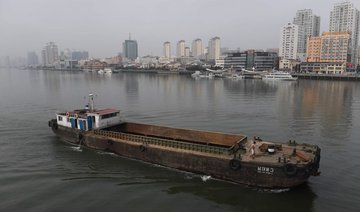UNITED NATIONS: The United Nations Security Council unanimously stepped up sanctions against North Korea on Monday over the country’s sixth and most powerful nuclear test on Sept. 3, imposing a ban on the country’s textile exports and capping imports of crude oil.
It was the ninth sanctions resolution unanimously adopted by the 15-member council since 2006 over North Korea’s ballistic missile and nuclear programs. The United States watered down an initial tougher draft resolution to win the support of Pyongyang ally China and Russia.
A week ago, US Ambassador to the United Nations Nikki Haley called for the “strongest possible” sanctions on North Korea and had sought an oil embargo on Pyongyang.
On Monday, Haley said the United States was not looking for war with North Korea and that Pyongyang had “not yet passed the point of no return.”
“If it agrees to stop its nuclear program, it can reclaim its future. If it proves it can live in peace, the world will live in peace with it,” she told the Security Council after the council adopted the new sanctions.
Haley added that the latest resolution “would not have happened” without the strong relationship that had developed between US President Donald Trump and Chinese President Xi Jinping.
China’s UN ambassador, Liu Jieyi, urged North Korea to “take seriously the expectations and will of the international community” and called on all parties to remain “cool-headed” and not stoke tensions.
A Security Council resolution needs nine votes in favor and no vetoes to pass. In negotiations on the latest resolution, diplomats said Russia had questioned what leverage the Security Council would have left if North Korea continued to conduct nuclear and missile testing.
“This is a compromise in order to get everybody on board,” French UN Ambassador Francois Delattre said of the draft ahead of the vote.
Textiles were North Korea’s second-biggest export after coal and other minerals in 2016, totaling $752 million, according to data from the Korea Trade-Investment Promotion Agency. Nearly 80 percent of the textile exports went to China.
The resolution imposes a ban on condensates and natural gas liquids, a cap of 2 million barrels a year on refined petroleum products, and a cap on crude oil exports to North Korea at current levels. China supplies most of North Korea’s crude.
A US official, familiar with the council negotiations and speaking on condition of anonymity, said North Korea imported some 4.5 million barrels of refined petroleum products annually and 4 million barrels of crude oil.
’DUE PRICE’
Trump has vowed not to allow North Korea to develop a nuclear missile capable of hitting the mainland United States.
North Korea was condemned globally for its latest nuclear test on Sept. 3, which it said was of an advanced hydrogen bomb.
Pyongyang warned the United States on Monday that it would pay a “due price” for spearheading efforts on UN sanctions.
“The world will witness how the DPRK tames the US gangsters by taking a series of actions tougher than they have ever envisaged,” the foreign ministry said in a statement carried by the official KCNA news agency.
DPRK stands for the North’s formal name, the Democratic People’s Republic of Korea.
The tensions have weighed on global markets, but there was some relief on Monday among investors that North Korea refrained from conducting another missile test this past weekend to celebrate 69 years since its founding.
European Council on Foreign Relations UN expert Richard Gowan said the United States had “rather predictably been mugged by reality” during the most recent negotiations” on sanctions. He added it was arguable, however, that the high US bar had pushed China and Russia to agree to more limited sanctions “relatively quickly.”
“China and Russia were never going to accept the severe package of sanctions tabled by Haley,” Gowan aid. “This sort of lengthy, incremental diplomatic bargaining may be the best it can hope for. The alternative is, after all, a slide toward war.”
Traditionally, the United States has discreetly negotiated with China on any North Korea sanctions before expanding talks to the full council once the five veto powers have agreed. More recently, that has typically taken one to three months.
China supplies most of North Korea’s crude. Chinese officials have privately expressed fears that an oil embargo could risk causing massive instability in its neighbor.
Chinese Foreign Ministry spokesman Geng Shuang stressed the need for consensus over North Korea and maintaining peace.
“I have said before that China agrees that the UN Security Council should make a further response and necessary actions with respect to North Korea’s sixth nuclear test,” he told reporters.
Russia and China have been critical that there is too much focus on pressuring North Korea with sanctions and not enough debate about kick-starting talks with Pyongyang.




























